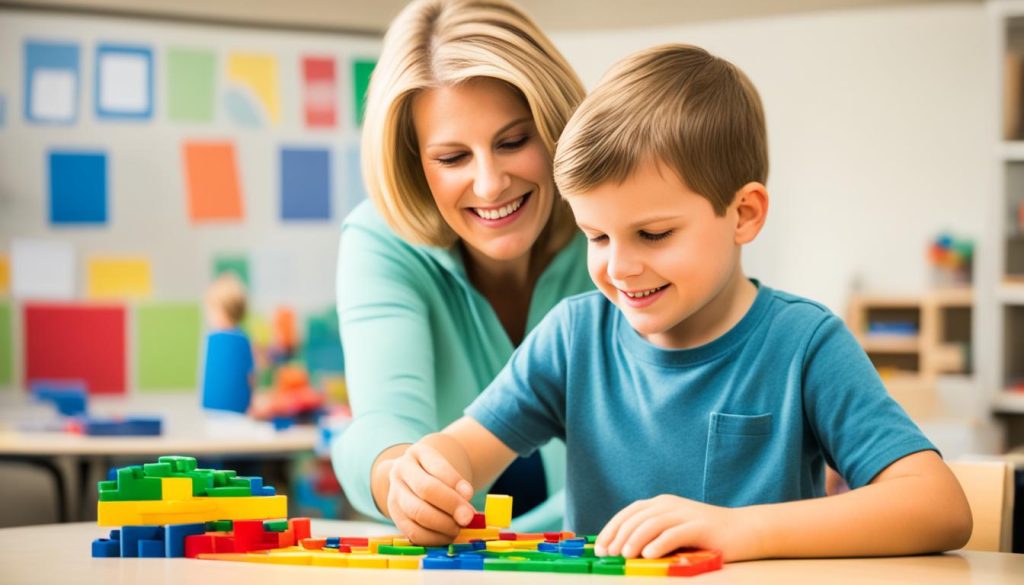Watching your child grow up can be tough, especially when they struggle to fit in and doubt their worth. It’s hard to see them feel pressured by media and friends. As parents, we can help by making our kids feel special and unique.
Helping your child find themselves is more than just reaching goals or learning new things. Like John Adams, who started at Harvard at fifteen, kids need support and a caring environment. It’s about building self-awareness and feeling secure in their identity, thanks to love at home.
Susan Straight’s story is touching. She found a painting her mom made in a trash can. This shows how important it is to support your child’s creativity and identity. We must make them feel seen, valued, and loved always. The Bible in Genesis tells us we’re all made in God’s image, each with our own special creativity.
Living by the values we want to teach our kids helps them see their worth isn’t tied to their skills or achievements. Feeling deeply loved helps them feel secure and know their identity is strong.
Key Takeaways
- Positive Parenting starts with love and acceptance.
- Supporting Child Creativity uncovers hidden talents and interests.
- It’s key to tackle outside pressures to keep a strong sense of self.
- A strong identity comes from knowing you’re loved and secure, not just from achievements.
- Parents are crucial in showing kids their unique value and potential, as the Bible teaches.
The Importance of Self-Identity in Child Development
Understanding self-identity in child development is key to boosting Emotional Intelligence in Children. Forming a self-identity is a complex process. It shapes many areas, from social skills to personal choices.

What is Self-Identity?
Self-identity is about the qualities and abilities a person sees in themselves. It’s about how they see themselves and the voice inside them that guides them. Studies show kids as young as 4–5 can start to understand their own traits.
This early start in self-identity is vital for making healthy social connections and Emotional Intelligence in Children.
Why Self-Identity Matters for Children
Self-identity is crucial for kids because it affects how they see themselves and the world. Kids tied to few social roles may feel sad if those roles change. Changes in self-identity can lead to feeling lonely or depressed.
Having a variety of social roles can help prevent these issues, supporting emotional health. Parents are key in shaping a teen’s self-identity. They do this through different parenting styles and helping their kids manage emotions, building resilience and emotional smarts.
| Aspect | Influences | Outcome |
|---|---|---|
| Parenting Style | Authoritative, Authoritarian, Permissive | Behavior, Self-esteem, Decision-making |
| Social Roles | Multiple, Limited | Mental Health, Resilience |
| Family Interaction | Dyadic, Triadic | Timidity, Agreeableness |
| Emotional Intelligence | Parental co-regulation | Healthy Identity Formation |
By supporting various social roles and using positive parenting, you can boost your child’s self-identity. This helps with their Child Development Milestones and Emotional Intelligence.
Live Your Values
Living your values helps shape your child’s identity. Show them what integrity, respect, and teamwork mean by living it yourself. It’s key to know the values you want to pass on and how to share them clearly.

Be a Good Role Model
Parents work hard to make sure their kids share their values. It’s a way to protect them from bad influences. Kids watch and copy what adults do.
Being consistent in what you say and do shows your kids the value of important values. When parents take responsibility, it teaches kids to do the same.
Encourage Positive Self-Talk
Positive self-talk helps build a child’s confidence and identity. Setting clear boundaries and being supportive lets them safely share their feelings. This approach is part of gentle parenting, focusing on empathy and respect.
By talking kindly to yourself and others, you teach your kids to do the same. This sets a strong foundation for their own positive attitudes.
| Values in Parenting | Impact on Children |
|---|---|
| Respect and Empathy | Fosters emotional intelligence and empathy in children |
| Consistency and Honesty | Builds trust and integrity |
| Responsibility | Enhances self-discipline and accountability |
| Positive Self-Talk | Boosts self-esteem and resilience |
Create a Culture of Acceptance
Creating a culture of acceptance is key for Building Self-Esteem in Children and Fostering Child Independence. It makes sure kids feel safe to try new things and learn from mistakes. This builds respect for everyone’s differences and promotes kindness.

Fostering a Safe Environment
A safe place is the base for Building Self-Esteem in Children. Kids need to feel safe to explore and be themselves without fear. This safety lets them take risks and grow stronger.
57% of expatriates worldwide have multicultural families, which can be tough. Acceptance and safety help kids deal with their mixed backgrounds.
Teaching Respect and Kindness
Teaching respect and kindness is key for Fostering Child Independence. In an accepting culture, kids learn to respect themselves and others. This builds a strong positive self-image.
32% of kids in multicultural families might face mental and social issues. Teaching respect for all cultures and backgrounds helps solve these problems. It shows how important kindness is.
For 6 out of 10 kids in multicultural families, balancing home and society can be hard. Talking openly and with respect about the family’s cultures helps. This creates an accepting space for Fostering Child Independence and Building Self-Esteem in Children.
| Challenge | Percentage | Solution |
|---|---|---|
| Identifying Cultural Identity | 21% | Create a safe and accepting environment |
| Psychological and Social Issues | 32% | Teach respect and kindness |
| Conflict Between Norms and Societal Expectations | 60% | Structured and respectful communication |
Empowerment Through Experiences
Empowering kids through real-life experiences is key to building confidence and resilience. Programs like The First Tee show how structured activities can help kids grow. By facing challenges, kids learn to persevere and find their identity.

Building Confidence Through Mastery
Kids feel confident when they master new skills and beat obstacles. Achieving small wins boosts their self-esteem, setting them up for success. Encouraging a growth mindset for kids means praising their efforts and progress, not just results. This approach teaches them the value of hard work and dedication.
Encouraging Resilience and Perseverance
Being resilient means learning from tough times and getting stronger. Dealing with handling sibling rivalry and other challenges helps kids grow resilient. By letting them work through conflicts, they learn important skills for managing emotions and solving problems.
Here are some key ways experiences empower kids:
| Empowerment Aspect | Description |
|---|---|
| Skill Mastery | Encourages confidence and a sense of achievement. |
| Resilience Building | Facilitates growth from challenges and setbacks. |
| Growth Mindset | Focuses on effort and learning, rather than innate ability. |
| Handling Sibling Rivalry | Teaches conflict resolution and emotional intelligence. |
| Parental Support | Provides guidance without over-intervening. |
By giving kids the tools to deal with life’s ups and downs, you help them succeed and stay well. Whether it’s mastering a hobby or dealing with family issues, you’re setting them up for a better future.
Building Self-Esteem in Children
Building a child’s self-esteem is key in Positive Reinforcement Parenting. By praising their efforts and progress, parents help kids develop a positive view of themselves. This boosts their confidence. Here are some ways to do this effectively:
Praise Efforts and Progress
Studies show that praising kids for their efforts and progress helps them build strong self-esteem (Source: Journal of Child Psychology). It’s important to focus on their hard work, not just the results. This approach teaches them to keep going and bounce back from setbacks.
For example, if your child finishes a tough puzzle, praise their patience and how they solved it. This kind of praise builds their confidence and resilience.
Focus on Strengths
Research says focusing on kids’ strengths makes them feel better about themselves and behave better (Source: Child Psychology & Development). Encouraging their hobbies is a great way to highlight these strengths. If your child loves painting, building, or playing music, support these interests.
This helps shape their identity and self-worth. It makes them feel good about who they are.
It’s also key to give kids chances to help others. Studies show that kids who do kind acts have higher self-esteem (Source: Social Psychology Research). So, getting your child involved in community service or helping friends can really help.
By using Positive Reinforcement Parenting and supporting their hobbies, you create a space where your child feels important, confident, and excited about growing up.
Effective Parent-Child Communication
Strong *parent-child communication* is key to building healthy self-esteem in kids. It’s about being open and supportive. Parents should be kind and patient, even when dealing with *child tantrums*.
Good communication is the cornerstone of a healthy parent-child relationship. Effective communication involves actively listening, offering empathy, and maintaining an open dialogue.
Many things help with effective *parent-child communication*. Cultural understanding and respect for gender and sexual diversity are important. Parents should value the unique backgrounds and beliefs of families. This makes everyone feel safe and supported.
- Parenting Arrangements: Recognize various setups like blended families, co-parenting, and single-parent families.
- Cultural Sensitivity: Respect different cultural and religious backgrounds and use interpreters for families with different primary languages.
Dealing with *child tantrums* in a calm way is crucial. Talking openly, listening well, and solving problems together are key strategies. Here are some tips:
- Active Listening: Make sure you get what parents and kids are saying.
- Feedback Mechanisms: Talk about problems, come up with solutions, and see how they work.
- Sensitive Discussions: Plan tough talks for the right time.
Working together as parents helps kids feel less stressed and more in control of their feelings. Studies show that kids start learning and growing from the start of life. This shows how important positive parenting is.
| Parenting Style | Outcome on Children |
|---|---|
| Authoritative | Healthy emotional and cognitive development |
| Authoritarian | Stress, peer pressure, family and social relationship problems |
| Permissive | Behavioral regulation issues |
| Uninvolved | Emotion regulation and behavior exhibit concerns |
Better *parent-child communication* leads to kids feeling good about who they are. It helps them stay emotionally stable and grow well. This means a healthier, more confident future for the next generation.
Encouraging Child Creativity and Personal Interests
Helping a child grow their creativity and interests is key to their growth. It keeps them curious and interested. By trying different activities, you help them find what they love and build their identity.
Exploring Hobbies and Talents
It’s important for kids to try out different hobbies. This helps grow their skills and find their talents. Giving them a mix of things like photography, music, and clay boosts their creativity.
Letting kids choose their creative tools is important for their independence and creativity. They can use things like puzzles, musical instruments, toys, and art supplies to be creative. Going on trips to new places also helps them see things differently, sparks creativity, and teaches them more.
The Role of Play in Child Development
Play is crucial for kids. It helps with their growth in body, mind, and social skills. It lets them explore with their senses and solve problems. It’s also a safe way for them to share feelings, relax, and learn about the world.
In school, letting kids be themselves is key. Outdoor play is good for their health and makes them love learning. It includes activities like art, music, sports, and games. Encouraging them to follow their interests makes them love learning and being creative for life.
It’s important to let kids try new things and make mistakes. They learn a lot from trying and failing. Giving them the chance to fail and learn helps them grow and be resilient.
Parenting and Raising Kids: Balancing Guidance and Freedom
Effective parenting means finding a good balance between guiding your child and giving them freedom. This balance helps your child grow confident, have high self-esteem, and become independent. Many parents find this balance hard, with 67% of parents, especially moms, finding it stressful.
Also, 85% of parents find it tough to share time and effort across different parenting tasks like cooking, homework help, building relationships, cleaning, and taking care of themselves.
When it comes to teaching kids gratitude and discipline, finding balance is key. 42% of parents focus on helping their kids with problems, showing they care deeply. Yet, this focus might lead to imbalance. 55% of parents say their lives are out of balance because they focus too much on their kids’ growth.
As kids grow, parents will spend less time on their needs as they become more independent. But 76% of parents make choices to prioritize tasks, even if it means their lives are not perfectly balanced. This shows how important it is to focus on children’s emotional and behavioral growth for their mental health and coping skills.
Keeping kids physically safe and healthy is key for their development. It ensures they stay safe from harm and helps them grow socially and cognitively. Social skills help them make good friends and get along with people from different backgrounds. Cognitive skills are crucial for doing well in school and include reading, writing, math, and solving problems.
It’s important to see that teaching kids discipline and gratitude is part of a bigger parenting plan. Parenting is shaped by many things like the child’s traits, parents’ past experiences, and cultural norms.
Parents’ knowledge and attitudes affect how they parent. Their belief in their parenting abilities is a big factor. Things like the child’s personality, parents’ past experiences, and cultural background also play a big role.
Using effective discipline and teaching gratitude helps find this balance. It helps raise responsible, caring kids ready for life’s challenges. A balanced approach between guiding and giving freedom is key to raising a well-rounded child.
Supporting Child Mental Health
Supporting child mental health is key for their well-being. The CDC says there’s been a rise in youth anxiety and depression from 2000 to 2020. It’s vital to understand the importance of sleep for kids. Kids aged 6 to 12 need 9–12 hours of sleep, and teens 13 to 18 need 8–10 hours.
Fathers are crucial in helping children’s mental health. Studies show a strong link between parents’ and children’s mental health. Parents dealing with depression or anxiety might struggle to care for their kids, affecting their mental health.
The CDC found more kids are getting diagnosed with anxiety and depression, with a 29% rise in anxiety and 27% in depression from 2016 to 2020. This highlights the need for early help and support for families. Kids in poverty are often hit harder, facing a higher risk of mental health issues.
| Age Group | Recommended Sleep | Physical Activity |
|---|---|---|
| Preschoolers | 10-13 hours per day | 3 hours of active play |
| 6-12 years | 9-12 hours per day | 60 minutes of moderate to vigorous activity |
| 13-18 years | 8-10 hours per day | 60 minutes of moderate to vigorous activity |
Not getting enough sleep can make anxiety and depression worse in kids. The National Alliance on Mental Illness (NAMI) and the Substance Abuse and Mental Health Services Administration (SAMHSA) offer help and resources.
To support child mental health, parents should learn about mental health issues and treatments. Supporting the child and family can lessen stress and improve outcomes. Encouraging kindness, healthy friendships, and emotional well-being is key.
Conclusion
Helping your child find their own identity and boost their self-esteem is key to their growth. By being a positive role model, talking well, and supporting them, kids can become more confident and resilient. Studies show that how you parent greatly affects your child’s personality and actions.
Talking about important issues like racism, sexism, consent, and bullying shapes their values and actions. Many parents focus on teaching their kids about money, being independent, and how to communicate openly. About 24 out of 50 parents think it’s vital to teach kids about managing money and saving. Another 17 believe in giving kids the freedom they need.
This shows that a balance of guidance and freedom is crucial for a well-rounded upbringing. Sharing values and experiences with your child strengthens your bond and positively influences their character.
Research also points out that while genes play a big part in traits like being neurotic or outgoing, parenting has a big impact too. Setting clear rules and goals, and talking openly, helps kids become more responsible and kind. By teaching them about diversity and acceptance, you’re preparing them for a future where they can handle life’s challenges with confidence and understanding.
Your influence in their life is powerful, often more than you might think. It shapes their ability to face life’s ups and downs with courage and empathy. This highlights the need to teach kids about diversity and acceptance.
FAQ
What is Self-Identity?
Why does self-identity matter for children?
How can I help my child build self-esteem?
How does living my values influence my child’s identity?
How can I create a culture of acceptance at home?
What role do real-life experiences play in my child’s development?
How can I foster effective parent-child communication?
Why is encouraging creativity and personal interests important?
How can I balance guidance and freedom in parenting?
What steps can I take to support my child’s mental health?
This post contains affiliate links. If you click on a link and make a purchase, I may earn a small commission — at no extra cost to you. Thank you for supporting this blog and helping me keep the patterns free! Read the full Affiliate Disclosure & Transparency.
